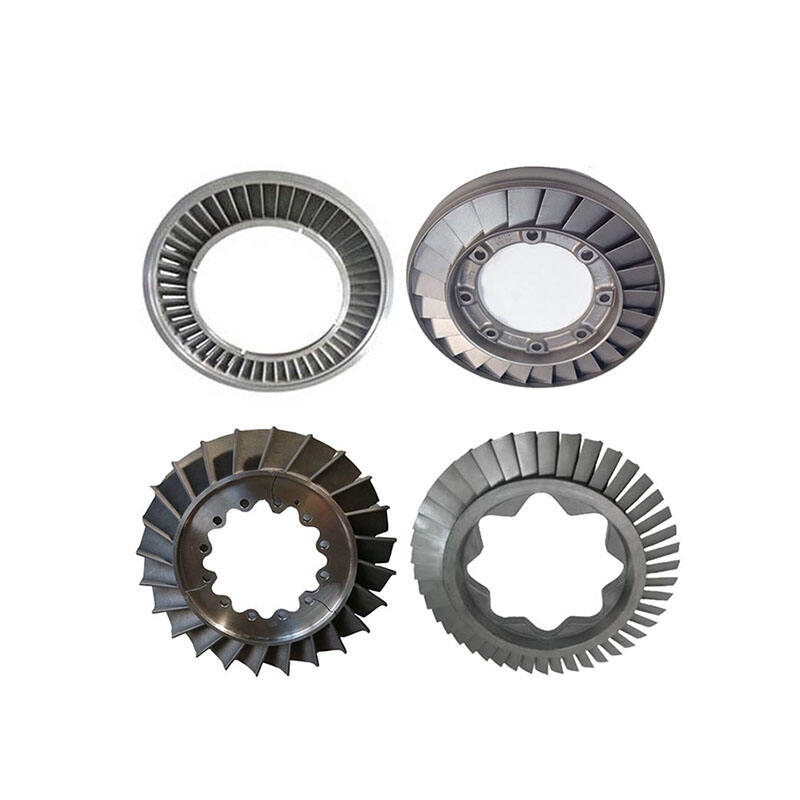Diffusorringene er en av de viktigste delene i strålerore. De har sin egen betydning når det gjelder hvordan motoren fungerer. Disse ringene består av en rekke materialer som samarbeider for å regulerer veien luft og branne tar gjennom motoren. Det påvirker ytelsen og driftseffektiviteten til motorene både direkte.
Det var den flermetallskivekonstruksjonen av en diffuserring. Ytesiden er ofte en metallbekleining, som titanium eller nickel. Disse metallene blir valgt fordi de lett kan tåle ekstremt høye temperaturer når motorens strøm forekommer. Dette er avgjørende ettersom motoren blir veldig varm under flyving. Keramiske materialer, for eksempel silisiumkarbid, brukes som innsiden av diffuserringen. Innsiden bruker nylig utviklet keramikk av toppklasse fasthet grunnet at det ikke slipes bort lett, og dermed bidrar betydelig til å øke lengden på diffuserringens levetid.
Tilbakeføringsring produsering
Tilbakeføringsringer produsert av O.B.T er en veldig kompleks prosess med mange detaljerte trinn. Disse trinnene omfatter gjutteri, maskinering og binding. Hvert eneste av disse trinnene er veldig krævende og må gjøres akkurat riktig for at det endelige produktet skal bli slik vi ønsker det.
Dusjringen formes innenfor en spesialbygd form da varmt væskemetall strømmer inn i den under kastesteppe. I virkeligheten må denne formen lages med ekstrem oppmerksomhet på detaljer. En feilformet form fører til en uakkurat dusjring på slutten, som ikke har formet seg etter den påkrevde formen og størrelsen for bruk inne i motoren. Defekter grunnet dårlig kasting kan oppdages, og hvis dette er tilfellet, vil det kompromittere hvor godt turbo ladnings dusjring fungerer.
Bruk av nye materialer
Jettemotorprodusenter søker konstant etter måter å forbedre ytelsen på motorene sine. De oppnår dette ved å bruke nye materialer i produksjonen av dusjringen. Nyere tider har selskaper også begynt å bruke silisiumnitrid (keramikk) i tillegg til de tradisjonelle materialene som brukes, slik som silisiumkarbid.
Det er mange fordeler med silisiumnitrid, som for eksempel dens styrke og evne til å motstå skader bedre enn den broske silisiumkarbid. Derfor kan nozzle-ringene laget av silisiumnitrid tåle høyere temperaturer, og deres levetid er høyere under drift. De nye materialene kan brukes til å lage spurt ring i turboopplader , som hjelper til å forbedre ytelsen og effektiviteten til strømningmotorer.
3D-skriving for Nozzle-ringer
3D-skriving, også kalt additiv fremstilling, har videre revolusjonert produksjonen av nozzle-ringer. Den er også en del av en ny teknologi som rister opp tingene når det gjelder produksjon av nozzle-ringer. 3D-skriving er en rask metode for produksjon som tillater å lage muningsring veldig nøyaktig og presist.
Gjennom 3D-skriveprosessen bygges lag av materiale opp ett på gangen til det nozzle-ringet er fullstendig formet. Det gjør det mulig å raskt fremstille komplekse design (som for eksempel Lattices og Stellated former) som praktisk talt ville vært umulig eller i beste fall veldig tidsforbrukende ved bruk av konvensjonelle fremstillingsmetoder. Uten 3D-skriving ville de fleste effektivere designene ført til økt avfall under produksjon.
Problemer rundt nozzle-ringer
Selv om det finnes mange gode grunner til å designe en nozzle-ring, er å opprette dem ingen liten oppgave. Hva er de hovedsaklige problemene ved å produsere slike nozzle-ringer med et nødvendig nivå av presisjon og dimensjonsnøyaktighet, er ikke én av dem? Og dette er veldig viktig, hvis vi begår noen feil, kan det føre til ytelsesproblemer i motoren selv for små feil.
En ytterligere vanskelighet er forfining av designet på de ringene som er knyttet til diffusorringen for å øke motoreffektiviteten. Det er her alt dette henger sammen for å få så mye luft og branne gjennom motoren mens man holder varmen nede på et nivå som ikke fysisk skader din utstyr. Alt disse overveielser må tas med i betraktning av ingeniører for å designe diffusorringe som optimerer ytelsen og effektiviteten TCM genererer.
 EN
EN
 AR
AR
 BG
BG
 HR
HR
 CS
CS
 DA
DA
 NL
NL
 FI
FI
 FR
FR
 DE
DE
 EL
EL
 HI
HI
 IT
IT
 JA
JA
 KO
KO
 NO
NO
 PL
PL
 PT
PT
 RO
RO
 RU
RU
 ES
ES
 SV
SV
 TL
TL
 IW
IW
 LV
LV
 LT
LT
 SR
SR
 SK
SK
 SL
SL
 UK
UK
 VI
VI
 ET
ET
 HU
HU
 TH
TH
 TR
TR
 AF
AF
 MS
MS
 GA
GA
 IS
IS

